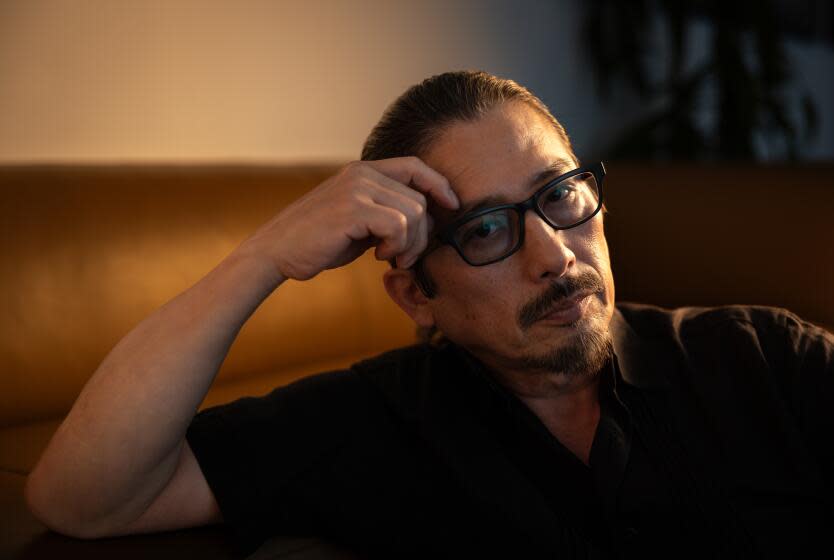How Hiroyuki Sanada plays his own hero in 'Shōgun'

Hiroyuki Sanada has lived a thousand lives in show business: child performer, action star, Shakespearean Fool, Hollywood actor. As a consultant, he has long helped bring authenticity to depictions of Japanese culture. But he knows he found the role of his life, on and off camera, in the acclaimed FX drama series “Shōgun.”
His work as an actor in the series is impressive enough. Sanada, 63, plays Lord Yoshii Toranaga, a member of the Council of Regents in 17th century Japan. A skilled military and political strategist, Toranaga is put to the test when his fellow regents look to oust him from power. With help from a shipwrecked Englishman (Cosmo Jarvis), an enigmatic translator (Anna Sawai) and an opportunistic, double-dealing lord (Tadanobu Asano), Toranaga emerges as a master chess player, allowing the action to come to him, responding accordingly and seemingly staying a step ahead of his enemies.
Sanada, best known to American audiences through such movies as “The Last Samurai” (2003), “Sunshine” (2007) and “Bullet Train” (2022), infuses Toranaga with a steely stillness, patient but dynamic. He was already well familiar with the character, or at least the historical figure on whom he is based. Tokugawa Ieyasu (1543-1616) was the first shōgun of Japan’s Tokugawa shogunate, and an important figure in the country’s unification. “He was a hero from my childhood,” Sanada says by phone from New York. “He created a peaceful era for a long time after the war period. He’s still a hero in Japan, and I hope that playing him and introducing what he did will bring a very important message to the world.”
Read more: The women in 'Shōgun' faced hardship in feudal Japan, but they still triumphed
So Sanada was deeply invested in “Shōgun,” which, like the 1980 miniseries before it, is based on James Clavell’s 1975 novel. And while the series tells the complete story of the novel, FX recently announced it will continue the story, with Sanada on board. But his performance as Toranaga was just the start. He has served as a historical and cultural consultant since “The Last Samurai,” in which Tom Cruise plays an embittered U.S. Army captain who travels east to train the Imperial Japanese Army (Sanada also plays the master swordsman Ujio). For “Shōgun,” created by Rachel Kondo and Justin Marks, he took his duties further, becoming a producer for the first time in his career.
Where he might have hesitated to offer guidance and advice on previous projects, this time he had license to bring his considerable expertise to bear on every element of the series, from performance to language to bringing in Japanese crew members who understood the period and the style.
To Sanada, the 1980 miniseries “showed feudal Japan only through blue eyes.” He had extensive conversations with Marks about not making the same mistakes. The new series uses subtitles throughout. The dense plotting assumes a level of intelligence on the audience’s part.
As Sanada puts it, “We tried to put more Japanese lenses on the script. We wanted to show more details of the culture, and the characters, rules, atmosphere and everything else. That's the biggest difference from the original ’80s series. Maybe audiences can understand easier this time.”
For Sawai, who plays the key role of the translator Mariko, Sanada’s presence was a godsend.
“As a person, he's just a delight,” she says in a video interview. “He is just a very good human. But on top of that, this show would not have been this accurate, authentic and epic without Hiro. He just really led everyone.”
Sanada would show up to the set on days when he wasn’t expected, “just to share his knowledge with us,” Sawai continues. “He was always there. He would go on FaceTime with me for hours on the weekend to go through my lines when I was just starting, because I wanted to make sure that I was doing the period Japanese correctly. I can't say enough good things about him.”
Born in Tokyo in 1960, Sanada found an early mentor in Sonny Chiba, the Japanese action star who started his own acting and martial arts school, Japan Action Club. Sanada signed up, and by the time he was a teenager he knew how to act, fight, sing, dance, perform stunts, ride horseback and do anything else a set or stage might require of him. He became a prolific presence in Japanese film and television, eventually even playing Tokugawa Ieyasu, the man on whom his “Shōgun” character is based, in the 1992 TV production “Oda Nobunaga.”
Read more: Review: 'Shogun' is an epic remake that focuses on feudal Japanese politics over romantic drama
But one of his most cherished career turning points took place on the stage. In 1999 and 2000 he played the Fool in a Royal Shakespeare Company production of “King Lear.” It was a daunting task, the most challenging English-language role of his career to that point. “Oh, my gosh, what an experience,” he recalls. “I don’t even remember opening night.” But he does remember hearing the warm laughter after his first barbed, epigrammatic zinger, and realizing that he could, in fact, do this.
He was named an Honorary Member of the Order of the British Empire (MBE) for his “contribution to spreading British culture in Japan.” You can hear the pride in his voice as he recalls his “Lear” experience, which he credits with giving him the confidence to pursue “The Last Samurai” and other Hollywood movies. He has called Los Angeles home for the last 20 years.
Now Sanada has reached a new plateau with “Shōgun” — and crystallized his purpose moving forward.
“I hope this is going to be a big, big step into the future for me, for the industry and for Japanese artists and crew,” he says. “I hope it’s going to introduce our culture to the world.”
This story originally appeared in Los Angeles Times.


